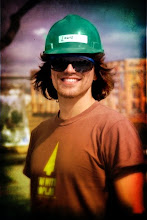The biggest mystery in the Peace Corps is its job description. Nobody actually knows what a Peace Corps Volunteer does, or what he or she is supposed to do. Often this applies to the serving volunteer himself, even as he is in the field. Before coming to the Peace Corps they had given us a pamphlet to read on what to expect as a volunteer, and from that I had it in my mind that I would be traversing dangerous wilderness, where I would stop by and visit mud-hut to mud-hut, drinking ceremoniously from a buffalo's horn while teaching people basic business skills and economics. I figured that I would be welcomed with open arms by everyone, and the knowledge I imparted would be immediately received and automatically life-changing. The description was literally that vague.
During our pre-service training we were all taught to memorize a phrase in Swahili that identifies what we are supposed to do as volunteers. The phrase goes, “Mimi ni mshauri wa biashara ndogo ndogo” which means “I am a small business adviser.” I remember how impossible it was to remember all of that at once, how foreign it felt in my mouth when I spoke it, and how I did not even know the meaning of the actual words. It was symbolic even, representing how little I knew about how I was actually going to spend the next two years of my life.
We repeated them countless times during pre-service training, so when we got out to our work sites it would be the first thing that would spout out of our mouths. We were adequately warned that people will see us as donors who bring money and start projects. That is why we put extra stress on the word “adviser.”
I have spent more than a year and a half in my site. In that time, I have taught computer skills to multiple people, facilitated guitar and piano lessons, taught bead making, made charcoal, started a table tennis team, organized a trash clean-up, made sanitary pads, and promoted gender equality. Although many of these activities are good, none of them had anything to do with being a business adviser.
A short while back, I met with a women's group which takes loans to pay for school fees. The problem with this group is that they have trouble paying the 20% interest rate on their loans, and paying for school fees is not exactly a good way to use a loan. I started out speaking slowly, introducing myself in Swahili and then continuing. We discussed the business of making food for selling like a restaurant would, the general concept of how money from a loan must be used to make more money, how much one will have to put into a savings box per day in order to have enough money to pay the loan at the end of the month, and what kind of business activities might be suitable for earning income. I pleaded with them to invest in rain gutters and tanks, and they asked me a great deal of questions about their loans. At the end of the session, they smiled and thanked me profusely for my time. None of them asked me for money.
I left feeling satisfied completely. After more than a year, I finally did the very thing I was expecting to do. I could now live up to the title I was forced to memorize, and could claim that now it was true. I am a small business adviser.
Subscribe to:
Post Comments (Atom)

My name is Sara Reeves. I am an RPCV (Samoa '07-09) and will be in Kenya this summer from May through July. I am managing an Indiana University School of Public and Environmental Affairs (SPEA) program that will bring 14 graduate students to (mostly) Western Kenya for a course on project design and internships with local partner organizations. We will be headquartered in Mumias, just outside of Kisumu, and most of our students will intern in the Western area, we also have one partner organization on the coast outside of Mombasa.
ReplyDeleteI am reaching out to PCVs in Kenya in the hopes you might be willing to provide advice/recommendations I can pass along to my students. About four months after our COS, my husband and I traveled for three months in Thailand and Cambodia. Beforehand I also reached out to PCVs in the area. They were able to provide invaluable advice and we were also able to meet up with many of them (which allowed us to stay in rural villages, rather than being trapped in the tourist spots).
If you would be willing to share insights into Kenyan culture and living and working in Kenya, that would be wonderful. In addition, any suggestions for a packing list are also welcome. I relied heavily on the Peace Corps Kenya Welcome Book when creating the handbook for my program. However, if I remember correctly from Samoa, the packing list in the welcome book does not include some of the most important things (and doesn't provide the context, so you do not realize until you arrive without an item on the list, you thought was silly, just how important that item is).
I appreciate your consideration. You can reach me at reevess@indiana.edu.
Thank you,
Sara Reeves
(RPCV, Samoa '07-09)